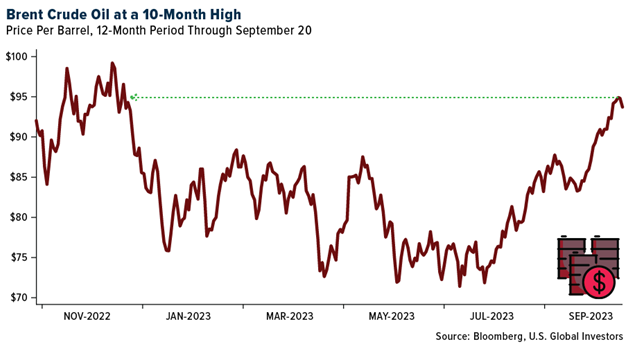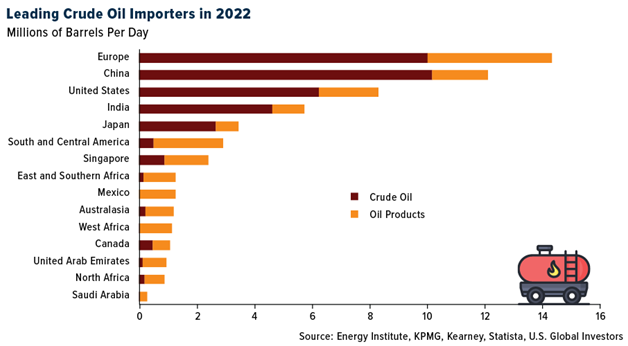As Brent crude edges closer to the symbolic threshold of $100 per barrel, nations and industries worldwide are bracing for the impact.
The surge to nearly $95 this week marks a 10-month high due to a bullish market pattern and supply cuts from the Organization of Petroleum Exporting Countries and Russia (OPEC+), now extended until at least the end of the year.

While this spike is fueling inflationary pressures globally, its impact will not be evenly distributed. Below, I’ll examine which countries and regions are most vulnerable to these rising oil prices and what that could mean for the global economy.
How OPEC’s Supply Cuts Could Usher In $100 Oil
OPEC’s—and, notably, Saudi Arabia's—continued reluctance to increase supply has constricted the oil market, and coupled with cautious economic optimism in major economies like the U.S., the asset may be ready to tip into the triple digits per barrel.
At least, that’s what hedge funds appear to believe right now, with the number of net long contracts jumping to an 18-month high, according to the Financial Times.
A recent Wood Mackenzie (WoodMac) report further suggests that we may be staring down the barrel (no pun intended) of sustained high oil prices.
Forecasting $90 per barrel crude in 2024, WoodMac analysts believe OPEC+ will increase production slowly over the next two years.
The implications for oil-dependent economies are noteworthy.
So, Who’s Most at Risk?
Last month, independent research firm Euromonitor International unveiled its Global Energy Vulnerability Index, aimed at assessing countries based on factors such as energy self-sufficiency, alternative energy adoption, and economic resilience.
High-production nations like Norway, Canada, Australia, and the U.S. scored high due to their diverse energy portfolios and economic stability, while resource-poor countries like Belarus, Lebanon, Singapore, and Hong Kong were flagged as vulnerable due to their reliance on imports and other economic factors.
Euromonitor was looking at all forms of energy, including not just oil but also other fossil fuels (coal and natural gas), as well as renewables (wind and solar, primarily).
For data on oil alone, I turned to the Energy Institute’s 2023 Statistical Review of World Energy.

Developed Economies:
Europe: With crude oil imports of over 10 million barrels per day in 2022, Europe stands to be severely impacted by rising oil prices. The European Central Bank (ECB) will face the challenge of battling inflation without stifling growth.
Japan: Japan's import figures stand at around 2 million barrels per day. Despite its technological prowess, Japan lacks energy resources, making it significantly vulnerable to fluctuations in the oil market.
Emerging Economies:
China: China imported slightly more oil than all of Europe per day in 2022, making it highly susceptible to rising oil prices. Its impact could spill over into global manufacturing and supply chains.
India: Importing 4 million barrels per day, India is another major player whose economy could feel the heat. Higher oil prices often translate into inflationary pressures in India, affecting millions of households.
Others:
Singapore: Despite being a developed, high-income nation, the Asian city-state’s economy could take a hit due to its high dependency on energy imports, standing at 891,000 barrels per day.
As Brent crude hovers around the $95 mark, countries dependent on oil imports must prepare for economic headwinds. The rise in oil prices—though favorable for oil-exporting nations like Norway, Qatar, and Nigeria—serves as a warning bell for countries heavily reliant on oil imports. Diversification of energy resources and enhancing economic resilience will end up being key strategies moving forward.
***
All opinions expressed and data provided are subject to change without notice. Some of these opinions may not be appropriate for every investor. By clicking the link(s) above, you will be directed to a third-party website(s). U.S. Global Investors does not endorse all information supplied by this/these website(s) and is not responsible for its/their content.
The Global Energy Vulnerability Index 2023 is designed to help leaders and businesses assess and benchmark a country's energy security, providing insights into potential risks, challenges, and opportunities in the markets where they operate or plan to expand into in the future.
